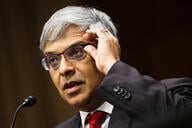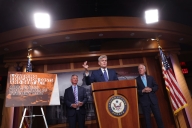You have /5 articles left.
Sign up for a free account or log in.
Republican presidential candidate Donald Trump called Monday for banning all Muslims from entering the U.S. “until our country's representatives can figure out what is going on.”
A written statement put out by Trump’s campaign in the wake of terrorist attacks in San Bernardino, Calif., and Paris cited “great hatred towards Americans by large segments of the Muslim population.”
“Where this hatred comes from and why we will have to determine,” said Trump, who is the front-runner among the Republican candidates. “Until we are able to determine and understand this problem and the dangerous threat it poses, our country cannot be the victims of horrendous attacks by people that believe only in Jihad, and have no sense of reason or respect for human life.”
Trump’s statement provoked immediate criticism. "One has to wonder what Donald Trump will say next as he ramps up his anti-Muslim bigotry,” Ibrahim Hooper, the national communications director at the Council on American-Islamic Relations, told The Washington Post. “Where is there left for him to go? Are we talking internment camps? Are we talking the final solution to the Muslim question? I feel like I'm back in the 1930s.”
Some of Trump’s competitors for the Republican presidential nomination also took to Twitter to condemn his proposal. Former Florida Governor Jeb Bush tweeted, “Donald Trump is unhinged. His 'policy' proposals are not serious.” U.S. Senator Lindsey Graham, of South Carolina, tweeted, “@Realdonaldtrump has gone from making absurd comments to being downright dangerous with his bombastic rhetoric.”
The leading candidate for the Democratic presidential nomination, Hillary Clinton, called Trump’s proposal “reprehensible, prejudiced and divisive.”
Trump’s campaign has been marked by his nativist rhetoric and policy proposals. In August, however, he expressed support for international students, tweeting, “When foreigners attend our great colleges and want to stay in the U.S., they should not be thrown out of our country.”
Nearly one million international students came to U.S. colleges and universities in 2014-15, according to a report published by the Institute of International Education. The report does not include data on international students’ religious affiliations, but more than 100,000 of those students hailed from the Middle East and North Africa regions.



